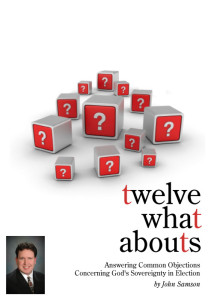 An author is always grateful to receive positive feedback concerning something he has written. I wrote the “Twelve What Abouts” book with the hope that those new to the subject of Sovereign Election, would be able to grasp the concepts clearly. If that goal was achieved then I give great thanks to the Lord.
An author is always grateful to receive positive feedback concerning something he has written. I wrote the “Twelve What Abouts” book with the hope that those new to the subject of Sovereign Election, would be able to grasp the concepts clearly. If that goal was achieved then I give great thanks to the Lord.
I just received this letter today from a gentleman named William.
Pastor Samson,
I wanted to thank you so much for you latest book ‘Twelve What Abouts.’ I just finished reading it and I was so blessed by it.
I am a Reformed Baptist with an MDiv from Southern Seminary and I found your short book to be one of the best responses to objections to Reformed Theology. Not that you have new information, but that you package it in a small, quick book that is to the point.
There are many books on Reformed theology, but most of them are very technical and are not accessible to the average layperson. I loved that your book is very easy to read and your arguments are very easy to follow.
I especially appreciated your chapters on 2 Pet 3:9 and 1 Tim 4:10. I had always heard the two wills theory and just found it somewhat lacking. Hearing your explanation fits the context so much better than other ones. Your explanation of common grace in 1 Tim 4:10 was good as well.
I really like the way you address traditions throughout the book, challenging the reader to consider whether their tradition matches what the text really says.
While I know your book will be read by many within the Reformed community, I hope that its brevity and style might appeal to those on the “other side”.
Thank you again for your work and I pray that God will continue to bless your ministry.
Grace be with you,
William Sandell

